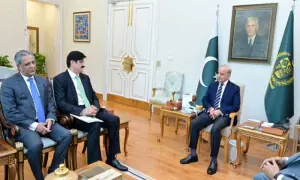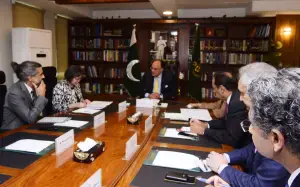Rupee falls by Rs18.98 against dollar in inter-bank market
4 min readKARACHI: The dollar’s value soared by Rs18.89 against the rupee in the inter-bank market, the State Bank of Pakistan said on Tuesday. The US currency closed at 285.09 after fluctuating between Rs280 and Rs290 during the day’s business.
“The situation will improve as soon as the IMF programme is completed,” Fahad Rauf, head of research at the Ismail Iqbal Securities Limited, told Aaj News when asked about the reasons for the freefall in the rupee’s value.
He added that it would open doors for inflows from other lenders and friendly countries. The situation would be better when the foreign exchange reserve stood at $7 to $8 billion.
The spike in dollar rates comes on the day when the State Bank of Pakistan is expected to raise its key policy rate by 200 basis points in an off-cycle meeting as the country struggles to unlock critical funding from the IMF, according to a Reuters poll.
All sixteen economists and market watchers surveyed by the news agency said there would be a hike – 14 of them predicted 200 basis points (bps), while two expected 250 bps.
The International Monetary Fund has asked Pakistan to maintain a market-based exchange rate, Rauf said. Exchange rate movement to cater for outflows to Afghanistan is one of the remaining agendas of the country in the stalled loan programme.
The cash-strapped country also decided to impose an additional surcharge of up to Rs3.82 for electricity consumers across the country in order to meet the international lender conditions on Wednesday. The IMF has urged Pakistan to tax the rich and provide subsidies to the poor.
The Pakistani rupee had been fluctuating since the progress on talks with the IMF and falling foreign exchange reserves. The rupee closed at Rs266.11 after depreciating by Rs4.61 on Wednesday.
The Ismail Iqbal Securities Limited research head added that the SBP did some “exercises” by allowing few payments, however, he called for administrative measures.
Business persons have been clamouring for allowing the manufacturing materials stuck at the Karachi port. The government has banned all but essential food and medicine imports until a lifeline bailout is agreed with the IMF.
This blockade, resulting in a shortage of dollars, has prompted many to opt for the “grey market”. Rauf shared a common impression that people intending to perform Umrah have also approached the same market for the US currency for the same reason.
He stressed the need for managing the demand and supply gap. “Pakistan suffered a shortage of tomatoes after floods hit Pakistan, and the price shot to Rs500. So there is no dollar and we are experiencing the prevailing situation,” he said.
“We don’t have many options,” Rauf and linked the opening of imports with an improvement in currency rate.
He went on to add that the increase in additional surcharge was not linked to the currency rate as it was not a big jump and it was linked to inflation.
‘Hoarding and grey market’
“Surely, this [over Rs18] is a big jump,” anchorperson Imran Sultan said. He was of the view that the appreciation in the dollar value was not linked to the delay in the IMF programme.
The international lender has stressed that Pakistan should bring the exchange rate at par with the gray market, he said, adding that three markets were operating in Pakistan: inter-bank, open, and “grey”.
“We all know that dollar is feeding in Afghanistan and India being in Afghanistan was buying it,” Sultan said and described it as a “factor” Pakistan’s economy.
Sultan, who is a business editor, claimed that the IMF has demanded Pakistan bring the value of US currency being followed in Iran and Afghanistan.
He rebuffed any impression that there was a shortage of dollars in Pakistan, alleging that many people have been hoarding the US currency. Sultan stressed the need for surveillance and blamed the “lapses” in SBP policies for the freefall.
Economic expert Dr Shahid Hasan Siddiqui said that Pakistan would 100% complete the IMF programme as neither the lender nor the US wants the country to get out of it.
He told Aaj News that the government was not taking structural reforms—an old demand of the IMF to bring Pakistan’s economy on track.
“It’s due to Moody’s downgrade and the delay in the staff level agreement of the IMF,” Alpha Beta Core CEO Khurram Schehzad said.
For the latest news, follow us on Twitter @Aaj_Urdu. We are also on Facebook, Instagram and YouTube.


























Comments are closed on this story.